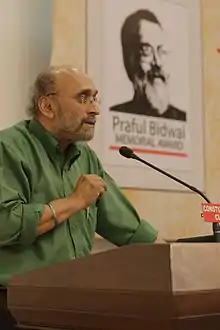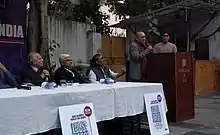Paranjoy Guha Thakurta
Paranjoy Guha Thakurta (born 5 October 1955) is an Indian journalist, writer, and a documentary maker.[1] He is also a guest faculty member at IIM Ahmedabad, Calcutta and Shillong, the University of Delhi, Jawaharlal Nehru University, Asian College of Journalism and Jamia Millia Islamia.[2]
Paranjoy Guha Thakurta | |
|---|---|
 Paranjoy Guha Thakurta - June 2016 | |
| Born | 5 October 1955 |
| Alma mater | University of Delhi |
| Occupation | Journalist, writer |
Notable work | Gas Wars |
| Website | paranjoy |
Career
Guha Thakurta was educated at La Martiniere Calcutta, pursued his undergraduate degree in Economics from St. Stephen's College and completed his masters from Delhi School of Economics in 1977. With the Emergency of 1975-77, he decided to be a journalist over being a lecturer. In June 1977, he joined a Kolkata-based magazine as assistant editor. Through his career spanning over 30 years, he has been associated with major media houses like Business India, Businessworld, The Telegraph, India Today and The Pioneer. He also hosted the chat show India Talks on CNBC-India which ran over 1400 episodes.[2]
In 2013, he directed a short documentary film Coal Curse which highlighted the wrongs in the Indian coal mining industry.[3] The 45-minute film, supported by Greenpeace, delved into the political economy of coal in contemporary India with the Singrauli example serving as a case study. This was Guha Thakurta's second film on coal, the earlier one being 'Hot as hell: Why Jharia is burning', that was produced in 2006 by the Public Service Broadcasting Trust.
His 2014 book Gas Wars: Crony Capitalism and the Ambanis, co-authored with Subir Ghosh and Jyotirmoy Chaudhuri, dealt with alleged irregularities of the prices of natural gas in the Indian market. Reliance Industries Limited, one of India's major conglomerates which is also involved in oil and gas exploration and production, sent a legal notice to Guha Thakurta and others for defamation through this book.[4]

In 2016, he joined EPW (Economic and Political Weekly) as Editor. Following his article on how Adani Group was benefited by the government policies, a defamation notice was sent to the Sameeksha Trust and the authors of the article. Soon after that, Guha Thakurta resigned as the Editor of EPW.[5] The article brought to light how the Government tweaked the rules which favoured a certain company within the Adani Group to the tune of Rs 500 Crores.[6] EPW tried to reach out to Ministry of Finance and Ministry of Industry and Commerce, but no explanation was given for this policy decision. The Adani Group is headed by Gautam Adani who is understood to be close to Prime Minister Narendra Modi.
Guha Thakurta was appointed Editor of the Economic and Political Weekly (EPW) in January 2016 replacing C Rammanohar Reddy, who steered the prestigious journal since 2004. Guha Thakurta resigned as editor of EPW on July 18, 2017 over alleged differences with the board of the Sameeksha Trust that runs the journal.[7][8]
Guha Thakurta co-authored an article [9][10] about the Adani Group's tax evasion following which Adani Power sent a legal notice to the Economic and Political Weekly. Fearing an expensive lawsuit by one of India’s biggest corporate houses EPW then decided to take down the article,[11] prompting Paranjoy Guha Thakurta's resignation.[12]
Paid news
Guha Thakurta was a member of the sub-committee set up by the Press Council of India to look into the malaise of paid news. Initially, the report titled '‘Paid News: How Corruption in the Indian Media Undermines Democracy" was to be released on 26 April 2010, but it was deferred after many members of the Council raised objections.[13] A diluted version of the report, which was released on 30 July 2010, raised a storm. A number of newspaper establishments were named as having indulged in editorial malpractices. These included Bennett, Coleman and Co (owners of The Times of India), HT Media (owners of Hindustan Times, Hindustan and Mint), Dainik Jagaran, Dainik Bhaskar, Punjab Kesari, Lokmat, Eenadu, and Sakshi group, among others.[14]
In September 2010, the Central Information Commission (CIC) of India directed the Council to make public the report as part of suo motu disclosure mandated under the Right to Information (RTI) Act.[15]
Guha Thakurta has since written extensively on the issue of "paid news". In a December 2013 article for First Post, he explained why the malaise of "paid news" is a threat to democracy:
The independence of the media and its ability to bring about transparency in society by playing an adversarial role against the establishment get compromised because of corruption within the folds of the media itself. Paid news is one particularly egregious manifestation of the ills of the corporatized media that puts out information that poses as if it has been independently and objectively produced but has actually been paid for.[16]
PIL on 2G case
Guha Thakurta was one of many well-known people who joined a public interest litigation in the 2G spectrum case, originally filed by the Centre for Public Interest Litigation (CPIL) led by lawyer Prashant Bhushan.[17] He has written extensively on the scam, with the first article on the subject appearing in The Economic Times in November 2007. Soon after its publication, a legal notice was served on him by Reliance Communications.[18]
Works
Books
- A Time of Coalitions: Divided We Stand, 2004 SAGE; co-author Shankar Raghuraman, ISBN 0761932372.
- Media Ethics, 2011 Oxford University Press, ISBN 9780198070870.
- Gas Wars: Crony Capitalism and the Ambanis, 2014 Paranjoy Guha Thakurta; co-authors Subir Ghosh and Jyotirmoy Chaudhuri, ISBN 8192855139.
- Sue the Messenger: How legal arm-twisting by corporates is shackling reportage and undermining democracy in India; co-author with Subir Ghosh; 2016 Paranjoy and Authors UpFront, ISBN 9789384439811.
- Thin Dividing Line: India, Mauritius and Global Illicit financial flows; co-authored with Shinzani Jain; 2017 Penguin Random House India, ISBN 9788184005882.
- Loose Pages:Court Cases That Could Have Shaken India, co-author Sourya Majumder, ISBN 9781684549245.

Documentaries
- Idiot Box or Window of Hope, 2003
- Hot As Hell: A Profile of Dhanbad, 2006
- Grabbing Eyeballs: What’s Unethical About Television News in India, 2007
- Advertorial: Selling News or Products?, 2009
- Blood & Iron: A Story of the Convergence of Crime, Business and Politics in Southern India, 2010-11
- The Great Indian Telecom Robbery, 2011
- Freedom Song, 2012
- A Thin Dividing Line, 2013
- Coal Curse, 2013
- In the Heart of Our Darkness: The Life and Death of Mahendra Karma, 2013
References
- "Paranjoy Thakurta". Jaipur Literature Festival. 4 January 2014. Retrieved 12 June 2014.
- Das, Agnibesh (22 December 2012). "There are no TV or print journalists. Just good or bad ones". The Weekend Leader. Retrieved 12 June 2014.
- Khurana, Chanpreet (19 April 2013). "Paranjoy Guha Thakurta - The black truth". Live Mint. Retrieved 12 June 2014.
- "RIL sends notice to Gas Wars authors". The Hindu. 18 April 2014. Retrieved 29 May 2014.
- "Paranjoy Guha Thakurta quits as EPW editor". The Hindu. Retrieved 19 July 2017.
- Dasgupta, Paranjoy Guha Thakurta, Advait Rao Palepu, Shinzani Jain and Abir. "Modi Government's Rs 500-Crore Bonanza to the Adani Group". thewire.in. Retrieved 19 July 2017.
- "Paranjoy Guha Thakurta quits as editor of Economic and Political Weekly over differences with board". Scroll.in. 18 July 2017.
- Staff Reporter (18 July 2017). "Paranjoy Guha Thakurta quits as EPW editor". The Hindu. ISSN 0971-751X. Retrieved 9 January 2018.
- "Modi Government's ₹500 Crore Bonanza to Adani Group Company". EPW.in. 17 June 2017. Archived from the original on 12 July 2017.CS1 maint: bot: original URL status unknown (link)
- "Modi Government's Rs 500-Crore Bonanza to the Adani Group". TheWire.in. 19 June 2017.
- "Adani Group 'SLAPP' Pushes EPW Editor Out of His Job". TheWire.in. 18 July 2017.
- "EPW Editor Steps Down After Legal Notice by Adani Group". TheQuint. 20 July 2017.
- "'Paid News': The Buried Report". Outlook. 6 August 2010. Retrieved 14 June 2015.
- "Final report on Paid News" (PDF). Press Council of India. 2010.
- Ghosh, Subir (21 September 2011). "'Paid news' report spectre returns to haunt Press Council". Asian Correspondent. Retrieved 13 June 2015.
- Guha Thakurta, Paranjoy (5 December 2013). "Why paid news is a threat to Indian democracy". First Post. Retrieved 18 June 2015.
- Singh, Shalini (15 December 2010). "PIL filed in SC to recover revenue lost to 2G scam". The Economic Times. Retrieved 18 June 2015.
- Guha Thakurta, Paranjoy (16 September 2010). "2G scam: Why I filed a PIL against the telecom minister". Rediff.com. Retrieved 18 June 2015.
External links
- Personal website
- Hot as hell on Culture Unplugged